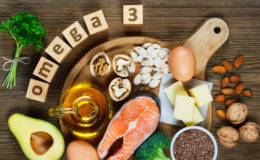When I was younger I experienced rapid heart palpitations that seemed to be triggered spontaneously and without rhyme or reason. This happened for several years starting as a teen. Everything would be normal, then, suddenly my heart would be racing up to 200 beats per minute for as long as two hours. I went to the doctor and had several tests done. I even had to do an overnight EKG with a cassette recorder strapped to my body in an attempt to record an incident. Unfortunately, nothing happened during the recording. In the end, I was told that nothing was wrong, sometimes this just happens, but people have reported that “eating a banana helps”.
I now understand clearly that I was deficient in electrolytes, causing my heart to beat erratically. The doctor was right and eating bananas did help because they are a dense source of potassium, but he didn’t seem to have any idea why. Other foods can help too, and the foods that I craved and preferred during that time were all high in potassium. My body intuitively understood what it needed.
Electrolytes are salts and minerals found in the blood that conduct electrical impulses in the body including sodium, potassium, magnesium, chloride, and calcium. They are essential mirconutrients for a number of bodily functions. The circulatory system is sometimes even be referred to as the heart’s electrical system. When someone’s heart stops, we use electrical stimulation to start it up again. This stuff is important!
Each electrolyte has a particular role and books have been written about them individually, so here’s a brief overview. In general, fruits and vegetables in the diet are great sources of electrolytes.
Sodium or Salt is so important historically that people were once paid in salt, that’s the origin of the word salary. Sea salt and Himalayan salt have the highest mineral content. Salt controls body fluids retention, blood pressure, and muscle functions. Sodium also helps to balance other electrolytes in the body. If you drink too much water without enough sodium/salt, you will potentially flush out important minerals.
Potassium plays an important role in cardiac conduction, bone health, and muscle contractions. Low potassium can be easily remedied by adding potassium rich foods to the diet. Best food sources of potassium are bananas, squash, papaya, leafy greens, oranges, melon, prunes, dates, avocado, kiwi, and coconut water.
Magnesium contributes to nerve and muscle function, supports healthy blood sugar levels, contributes to optimal immune function, helps keep the heartbeat steady, and allows muscles to relax. It can be found in dark chocolate, pumpkin seeds, legumes, nuts, and some fatty fish. Epsom salt baths are also a great source of magnesium absorbed through the skin.
Calcium, as many of us already know, is essential for strong bones and teeth, managing nerve impulses, influences muscle contractions, and plays a role in preventing blood clots.
Chloride helps maintain fluid balance and pH balance in the blood and cells of the body. It is found in sea salt, sodium chloride, and in higher concentrations in seaweed, rye, tomatoes, lettuce, celery, and olives.
Phosphate participates in bone and teeth repair, nerve functions, and healthy muscle contractions. It can be found in high protein products such as meat and dairy and also nuts and whole grains.
In order for electrolytes to do their job, hydration is critical. Be sure to drink plenty of water throughout the day, especially during the hot summer months. Spring water is a great choice because it has it’s own mineral content including important electrolytes. The label on the bottle with show the mineral compositions.
Low levels of potassium, magnesium, and calcium often lead to symptoms and imbalances. It’s important to recognize that the electrolytes need to be balanced and we need all of them. This is especially true of calcium and magnesium in relation to each other and can also be true between sodium and potassium. For example, if there’s too much calcium in relation to magnesium, the muscles will have strong contractions, but have less ability to relax which unknowingly puts us in a continual stress response. This is why it feels so good to soak in an epsom salt bath to relieve sore muscles. Excess calcium can also lead to calcifications in the body, which can occur as fibroids, kidney stones, or benign cysts or tumors.
Symptoms of electrolyte imbalance can include and are not limited to:
- Rapid or irregular heartbeat
- Nausea
- Lethargy
- Fluid retention
- Chest pains
- Muscle cramps
- Headache
- Fatigue
- Weakness
There are specific dietary causes of electrolyte imbalance, and there are also many lifestyle and general health factors that contribute to electrolyte depletion. If you have a lot of stress for example, you will benefit from paying attention to electrolyte intake and replenishing them frequently.
Electrolytes depletion can come from:
- Stress
- Low-level emotions such as shame, guilt, apathy, fear, anger, grief
- Intense physical activity
- Drinking alcohol
- Poor diet high in processed foods
- Antibiotics
- Illness
- Sweating
- Vomiting or diarrhea
- Constipation
- Eating disorders
If you suspect you may have an electrolyte imbalance, a simple blood test will inform of any deficiencies. If you have severe symptoms and concerns, it would be advisable to discuss this with your doctor. In my case, when my heart would start racing and I followed the informal advice of the doctor to a banana, I would get immediate feedback as my heartbeat regulated quite quickly, although there are plenty of other options to choose from.
Electrolytes are essential for the body’s optimal function and are continually being depleted. Replenish these important nutrients by eating lots of fruits and vegetables, drinking plenty of water, and using high quality salt. Avoid processed foods and commercial electrolyte drinks that are highly processed and full of sugar. Balanced electrolytes will contribute to maintaining optimal bodily functions and attaining good overall health.







